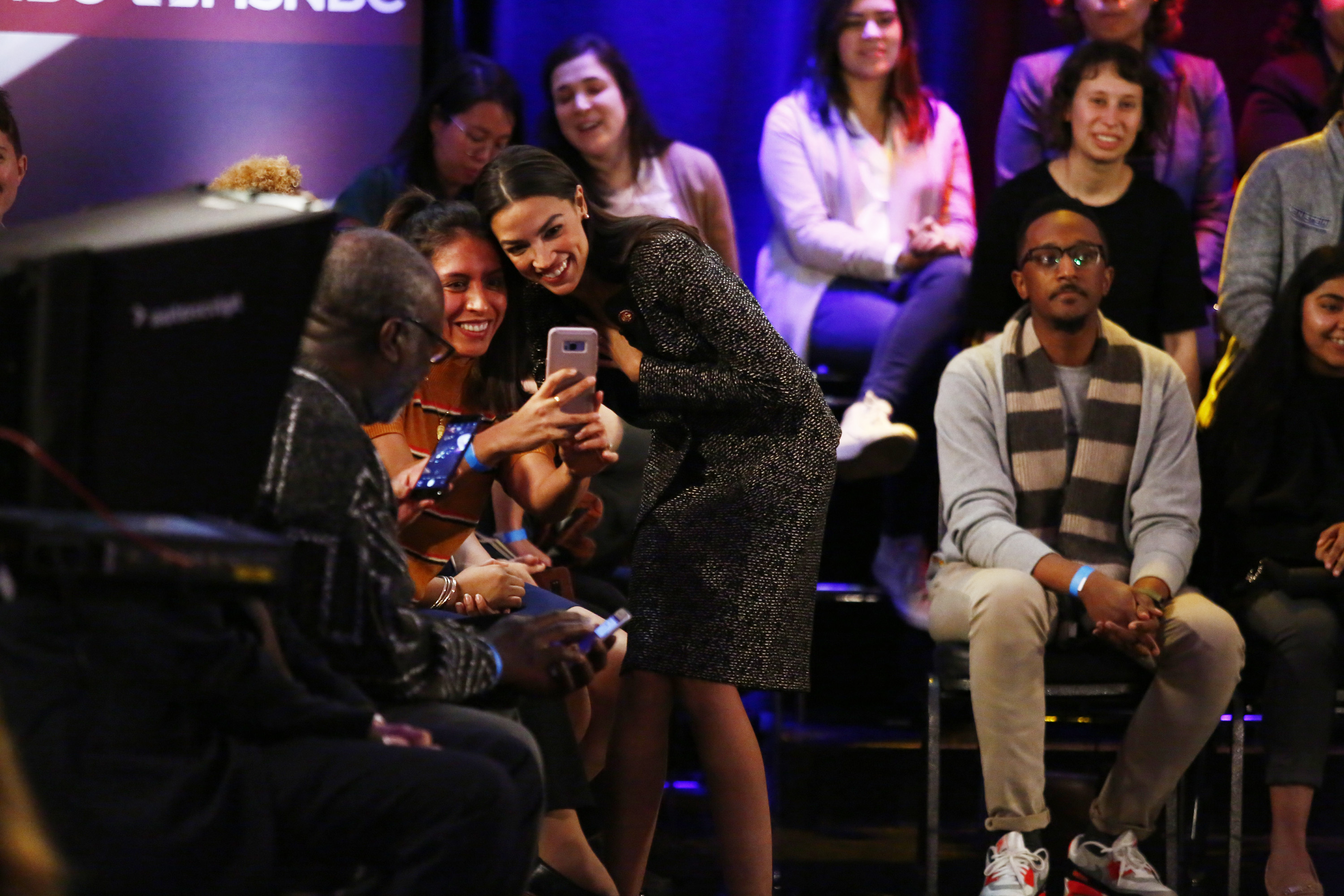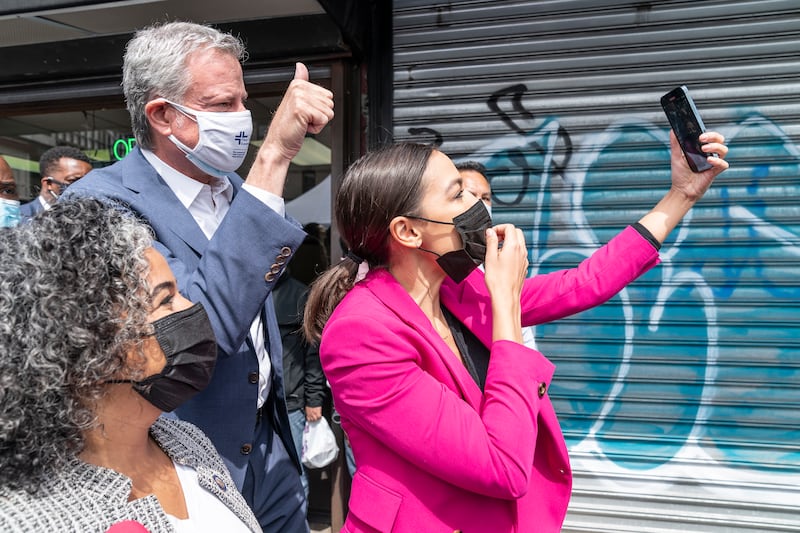This excerpt from When We’re in Charge has been lightly edited.
I’m going to state the obvious here: Social media can be a necessary and positive tool for advancement—it can win elections, change lives, and transform societies.
It can also, on a personal level, totally mess with your head unless you set clear and explicit boundaries. Your followers, whether it‘s online or in real life, don’t really know you, even when they think they know you.
One of the best to do it: Congresswoman Alexandria Ocasio-Cortez (AOC) beat out a Democratic incumbent in New York City in a 2018 primary and became the youngest woman to ever serve in Congress when she took office at twenty-nine years old.
A former waitress and organizer turned elected official, she’s raised the bar on how to use social media in a way that feels authentic, genuine, and strategic, and for leaders looking to strike a balance online, she’s at the top of the list of excellence.

The tools and tactics have shifted over the years, but even looking back, she was always on her A game online. From a compelling video that could help her raise money to visual branding that stood out among the crowd to content that was real (but with boundaries!)—AOC seemed like an authentic version of herself online.
In particular, she’s strategically used live streams to connect to her base: From logging on to Twitch to play video games—which she described to The Washington Post as “kind of like the way some of my colleagues talk about golf”—to using Instagram Live to talk directly to the camera about what she experienced during the January 6 insurrection, she’s cultivated a remarkable amount of intimacy with her community.

I remember that 2021 stream in particular, sitting in my bedroom, riveted to my phone as she looked into the camera and expressed the panic she felt hiding behind her office door. It was like FaceTiming with my friend, who just happened to be the congresswoman from New York. (To be clear: She’s not my friend; we’ve never met.)
Going through the screenshots on my phone, it seems like every few months I have one from one of AOC’s Instagram stories—whether because I laughed when she described the Capitol building as a kind of Hogwarts, I found it compelling when she was explaining how she chose a dress to wear to a diplomatic meeting, or I wanted her recommendation on which beauty balm cream to use as foundation, her social media has stuck with me.
Sometimes being a new member of the House feels like being in Hogwarts. There are lots of arcane parliamentary phrases (I jokingly call them “magic spells”) one can learn to speak on the floor or gain exceptions.Deep knowledge of these rules is rare but can be powerful.
— Alexandria Ocasio-Cortez (@AOC) December 13, 2019
AOC has made the highfalutin office of United States representative seem approachable and real and given us, her followers, a carefully curated feeling of community and insider-ness with her. She isn’t a stranger or an elite—she is one of us, while also leading us. I trust her because, thanks to her social media, I feel like I know her.
I also know that I absolutely don’t know her, not even a little. Instagram is not reality, and as a member of Congress, she is actually one of the more powerful people in the country. I only know the version of her that she presents online.
As you think about how to incorporate AOC’s example into your own social media presence, consider what kind of hate you might get, and remember: Leadership means taking a stand, and taking a stand means some people are going to disagree with you. When that disagreement shows up online, it can quickly get personal, because online, you’re not a real person.
Even knowing that, being on the receiving end of nastiness and cruelty can be exhausting (or worse) and can quickly get dangerous. Trolls are everywhere.
If your leadership takes you into a more public role, your trolls may grow in volume, and it may feel more personal. It‘s not personal, even when the comments specifically say: This is personal! It‘s still not. They’re mad about what you represent: change, disruption, a force against the status quo. That depersonalization doesn’t make them go away, but it can turn down the impact on your sense of self.
I say this because sometimes the haters will defend themselves as if they’re good-faith critics: Trolling and doxing are different from feedback. Feedback is a gift that, when delivered thoughtfully with compassion, clarity, and integrity, can make you better.

You will never be doing everything right, you always have opportunities for growth, and there are people who you can and should trust to give you honest, constructive guidance. Online trolls, especially ones who do not actually know you, are not those people. They’re just a–holes.
Even if your leadership role is not explicitly public, you still might encounter some online trolling that eats away at you. Maybe former employees will shit talk you on social media—a deeply nonstrategic move on their part, but hey, everyone has their own goals—or maybe your company or brand ends up on the receiving end of a lot of online hate. Whatever it may be: They have a right to say whatever they want, and you have a right to mute or ignore it at your leisure. I say this only kind of joking: What other people have to say or post about you online is none of your business.
Many of those I’ve spoken to about using social media as a leader have brought up the anxiety of knowing any Zoom meeting could be recorded, any email could be screenshotted, and any post online could be taken out of context. There is no room for turning it off, even in the highest-trust environments. The balance between internal management and external communication is exhausting and requires constant context shifting and a perpetual balancing act between different personas.
Part of the solution is to show vulnerability and our more human sides. But as I’ve been hammering home: You can’t really do that, at least not to the fullest extent possible.
If it ever reaches a point that you do not want to have to deal with, you can and should protect your peace. Log off. Make your accounts private. Hand off your passwords to someone else or shut the accounts down entirely. No leadership goal is worth the hit to your mental health.
When We’re In Charge is a no-bulls–t guide for the next generation of leaders on how to show up differently, break the cycle of bad boomer leadership, and navigate the changing demands of those in power and the evolving expectations people have of their workplace.
The post Opinion: How AOC Wins Social Media Without Trolls Taking Her Down appeared first on The Daily Beast.



